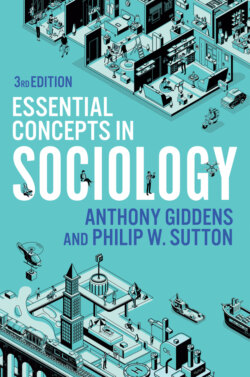Читать книгу Essential Concepts in Sociology - Anthony Giddens - Страница 34
Continuing Relevance
ОглавлениеThe concept of postmodernity was bound to be controversial given that sociology itself is rooted in a modernist approach. What would be the point of sociology if we gave up on trying to understand and explain social reality and to apply that knowledge in order to improve it? Nonetheless, postmodernity has had a longerlasting impact on the discipline. The opening up of plural viewpoints and diverse interpretations of the same social reality means that sociologists can no longer assume an unproblematic common culture or shared values within society but have to be sensitive to cultural diversity.
The 1980s and 1990s saw a proliferation of books and articles on postmodernity and postmodern culture, but by the turn of the century the ‘postmodern turn’ appeared to be over as the concept of globalization rose to prominence across the social sciences. Some have argued that postmodern ideas were essentially an academic fashion that has now passed (McGuigan 2006; Nealon 2012). But is this correct?
Garnar (2020) argues that the concept of postmodernity is still relevant. Differentiating between postmodernism as a series of cultural phenomena and postmodernity as an epoch that moves beyond that of modernity, he argues that the former has seen significant shifts, while the latter continues to characterize our global age. In particular, Garnar (2020: 5–6) focuses on the role of digital technologies, arguing that ‘the postmodern condition is shot through with technology’ and that these are one element of the postmodern condition, alongside changes in production and consumption, global relations and structures of power. The internet, mass computing, tablets, smartphones, satellite and cable TV are all forms of ‘postmodern technology’ which encourage and facilitate the playfulness, heterogeneity and anti-hierarchical practices associated with the postmodern. And, to the extent that digital technology has become embedded in everyday life, then this can, arguably, be discussed as a postmodern age.
